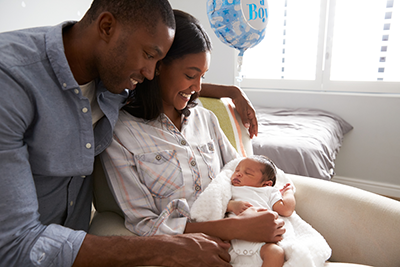 Welcoming a new baby brings a lot of joy and excitement. But, for many moms, the first few months after a baby—often called the fourth trimester—can be overwhelming as well. As you’re adjusting to caring for a newborn, don’t forget to care for yourself too.
Welcoming a new baby brings a lot of joy and excitement. But, for many moms, the first few months after a baby—often called the fourth trimester—can be overwhelming as well. As you’re adjusting to caring for a newborn, don’t forget to care for yourself too.
From focusing on your physical health to caring for emotional well-being, here are a few steps you can take to get the right support and make the transition into motherhood a little smoother.
Protect time for rest and healing
Childbirth is a major event for your body. It needs time and rest so that it heals properly. The U.S. Library of Medicine says that it’s important to get as much rest as you can and follow your OB GYN’s directions on activities to limit or avoid. Before you deliver, talk with your partner and other loved ones about how they can support you to make sure you get the rest you need.
Support healthy nutrition
When you’re busy caring for a baby, it’s easy to forget about nutrition. However, a healthy diet will give you the energy you need and help your body recover. If you’re breastfeeding, the Centers for Disease Control and Prevention says you’ll need an extra 450-500 calories a day. Many moms find it helpful to stock their pantry and freezer before they deliver to make quick meals and snacks easier.
Plan for help with daily tasks
Different moms need help in different ways. Think through how your loved ones can best support you when they say, “How can I help?” The Office on Women’s Health says you shouldn’t be afraid to ask for help with tasks like cooking, laundry, and cleaning. If you have other children, make a plan before you deliver for help with them while you adjust to your newborn. And, if you need a little time away from your new baby, it’s OK to ask for help with that too.
Care for mental and emotional health
It’s normal to have many emotions after the birth of your baby, including periods of feeling sad. However, make sure you and those around you know the signs of postpartum depression. The Centers for Disease Control and Prevention says postpartum depression is more intense and lasts longer than just a few days of “baby blues.” If you’re having a hard time coping or think you’re experiencing depression, don’t be afraid to contact your OB GYN. He or she is there to connect you with the support you need.
Keep realistic expectations
During these first weeks, you may only have the time and energy to care for your baby, sleep, and eat. And that’s completely normal as a new mom. Prioritizing your basic needs—and letting the rest go—can help you reduce stress and refocus on what’s important. Go easy on your to-do list and slowly add activities back in as you are able.
Trust your instincts
You’ll likely get a lot of information from many different sources about what’s normal after delivery. But, remember, you know your body best. From physical healing to breastfeeding struggles to mental health, speak up if something isn’t working or doesn’t feel right. The American Academy of Family Physicians reminds new moms to trust their instincts and call their doctor if they’re concerned.
Follow up with your OB GYN
Postpartum care helps make sure you’re healing, gives you a place to ask any questions you may have, and lets you plan for your future health. In general, you should have a comprehensive postpartum checkup within the first 12 weeks after delivery. But the American College of Obstetricians and Gynecologists says postpartum care should be an ongoing process too. As you navigate the fourth trimester and beyond, your OB GYN is there to support your changing health needs.
